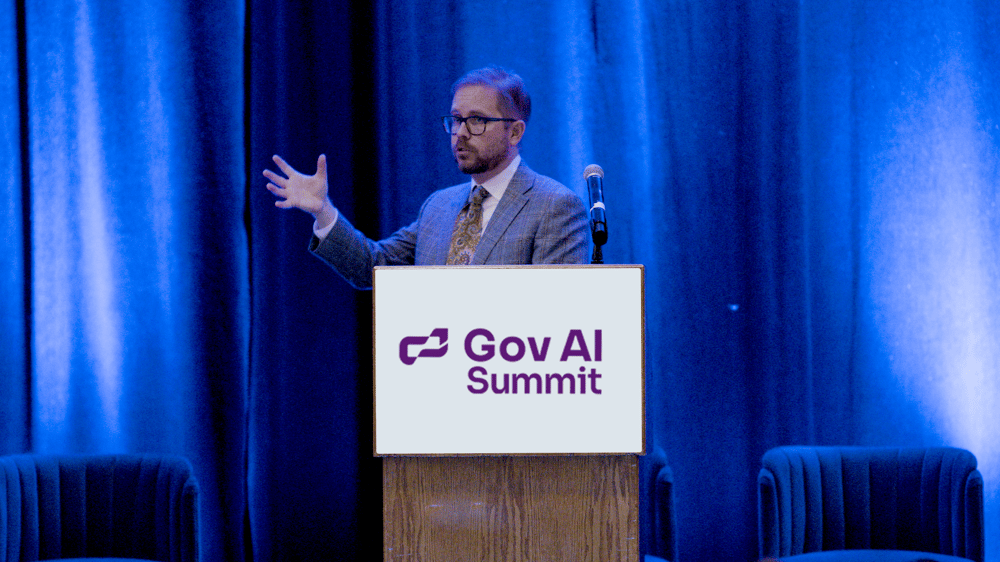Human-Centered Homeland Security
Modev News VOICEandAI gnrt 24-03-26 Modev Staff Writers 3 min read

A Vision for 2030 with Sam Howerton, Chief Scientist, Dept of Homeland Security
Modev had the pleasure of featuring Sam Howerton, the Chief Scientist at the Department of Homeland Security, at GovAI 2023, where he took us on a journey into the future of human-centered homeland security. With a candid and engaging narrative, Sam shared his vision for 2030, where people and technology converge to create a safer, more responsive, and empathetic security landscape.
Sam kicked things off with a surprising confession: despite his prestigious title, he's not an AI expert nor a computer scientist. In fact, his last significant coding endeavor was in FORTRAN (remember that?) during his undergrad days in Tennessee. This set the stage for a discussion centered on the human element in homeland security, which, is sometimes overshadowed by our fascination with technology.
His talk revolved around three main themes:
- Understanding the world we live in.
- Defining human-centered homeland security for both customers and operators
- Advocating for collaboration with the broader community
Let's dive into the above a little bit deeper.
Understanding the World We Live In
Sam first painted a picture of the current and future ecosystem that Homeland Security operates within. He described a world in which artificial intelligence and government services intersect, creating both opportunities and challenges. He talked about the recent executive order that provides direction and guidance for AI but also acknowledged how muddy the waters can become when international perspectives and commercial sector ideas come into play.
The world is evolving towards a future where the convergence of edge computing and artificial intelligence (AI) unlocks vast and swift capabilities, reshaping the landscape of technology and its applications. DeepMind's AlphaFold is a prime example of AI's transformative power, where the program's ability to predict the 3D structures of proteins from their amino acid sequences has monumental implications for medical research, drug development, and understanding biological processes. This leap in computational biology could lead to breakthroughs in treating diseases and designing new enzymes for various industries.
However, every coin has a flip side. There are some potential dangers of technology, particularly regarding the spread of misinformation. There was a tragic event in Dublin where a stabbing attack on children was rapidly followed by the dissemination of false information online, which wrongfully accused immigrants of the crime. That led to violent public reactions, including the burning of trams and police cars, showcasing the real and immediate consequences that can arise from the misuse of technology to spread misinformation and stoke societal tensions.
Human-Centered Homeland Security
The vision for human-centered homeland security is twofold, focusing on the customers - the American citizenry - and the operators, including DHS staff and first responders.
For customers, interactions with homeland security are frictionless and responsive. Natural disaster victims don't have to fill out countless forms and where the immigration process is more accessible for non-English speakers, thanks to generative AI. The ultimate goal is for DHS to operate so smoothly that it's almost invisible to the public—there when you need it, unobtrusive when you don't.
When it comes to operators, this technology can satisfy the evolving needs of those on the front lines. The Chicago Fire Department is helping develop technology that can locate a fallen firefighter in a smoke-filled, burning building. This task is as critical as it is complex. The future operator will need to be both physically capable and digitally fluent, able to navigate a rapidly changing technological landscape while performing their essential duties.
A Call for Collaboration
Perhaps the most compelling part of Sam's talk was his call for help from the community. He candidly and humbly acknowledged that DHS doesn't have all the answers or capabilities and that the path forward involves deepening partnerships with creative individuals and organizations.
Sam's appeal for collaboration extended beyond a mere request; it was an invitation to innovate together for the common good. He emphasized that the challenges DHS faces are multifaceted and evolving, and tackling them requires a collective effort that leverages diverse expertise. At the same time, he reassured the audience that their contributions, regardless of scale, are valuable and that open lines of communication with DHS are available for those ready to make a difference. This collaborative spirit is poised to shape a more responsive, efficient, and people-focused homeland security for the future.
His message was clear: the future of homeland security is not just a government endeavor; it's a collaborative effort that requires input and innovation from all sectors. We're all part of the solution.
Wrap Up
The vision for human-centered homeland security by 2030 is one of empathy, efficiency, and collaboration. It's a future where technology serves people, where the needs of every individual are considered, and the collective expertise of the community is harnessed to create a safer, more resilient society.
In reflecting upon Sam's shared insights, it becomes clear that the journey to 2030 will require us to think differently about security, prioritize the human experience, and work together to harness the power of technology for the greater good. At Modev, we share the DHS's view that our collective efforts should aim to establish a world that is not only secure but also embodies inclusivity and compassion for every individual.